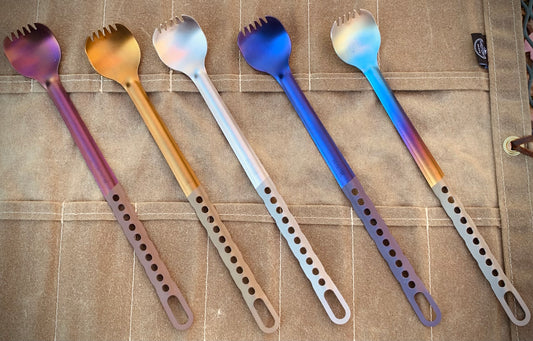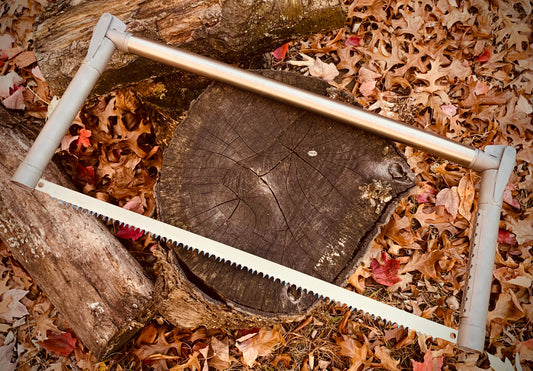Woods Monkey BLOG
Knife Review: The Banana Peel
By George Nikolakopoulos
One of the first tools humans created was the knife. Made from stone, bone, and later metal, it has remained a companion from the homestead to the battlefield for centuries. Archeologists have discovered knives dating back thousands of years. Most of them are fixed-blade knives, meaning the blade is permanently connected to a handle. They have also found ancient folding knives, especially friction folding knives. The oldest specimen was found in Austria and dated around 600 B.C. Roman soldiers of the 1st century also carried and used friction folders. A friction folder is defined as a folding knife that uses friction to keep the blade closed and requires pressure from the hand to remain open. These types of folders were common worldwide for centuries and remain popular today.
Woods Monkey Banana Peel
The Woods Monkey friction folder, the Banana Peel, is a step up from the traditional friction folder most people have in mind. Friction folders are usually made from simple materials, like carbon steel and their handles made of plastic or wood. Traditionally, a friction folder is a budget knife. Not the Woods Monkey folder. This knife is made from high quality steel like A2, AEB-L, MagnaCut, and even 3V! It also comes in different grinds, the most common are the flat and the scandi grind. The shape of the blade comes in different styles too. You can choose between drop, spear, and clip points, and versions with a straight razor type blade, or a sheepsfoot style blade. The handles are shaped like a banana and are made from micarta, G-10, or kydex. The color palette is endless. The most interesting feature is the thickness of the handles. It comes thicknesses from 1/8”, 1/4” or 3/8” micarta and G10 and .080 kydex. The 3/8” thickness provides great control, since it fills the palm better, but weighs more than a folder with a 1/8” thickness. The latter, with its thinner profile, is lighter and more easily adaptable for everyday carry in a pocket.

The knife that I currently own has a spear point, scandi grind A2 blade. The thickness of the green micarta handle is 3/8”. The knife’s overall length is 18cm, when deployed, while the blade’s cutting edge is approximately 5cm. The thick micarta handles provide excellent control and a firm grip even in wet conditions. I have used the knife for feather-sticking and making tent pegs. The scandi grind is working great. The A2 steel holds an edge very well. I really like the fact that the lever of the blade that is used for the opening and closing action is not as large as on other models. It does provide a great safety measure and offers better carrying ability.
 Feathersticks and tent pegs using the Banana Peel friction folder.
Feathersticks and tent pegs using the Banana Peel friction folder.
The handles are held together by three screws. Using a flat screwdriver, you can unfasten them easily. That allows for a good cleaning of the handles and the blade. A very nice feature that isn’t viable in other friction folders.

The friction folder taken apart with just a simple screwdriver. Maintenance never was easier!
The most amazing feature of the Woods Monkey friction folder is the fact that you can change handles. You can change not only the color option but also the thickness of the handle. You can buy a set of 1/8” orange G-10 handles and swap out the 3/8 green micarta ones. The Woods Monkey friction folder is truly a modular folder!
With so many features and styles the Woods Monkey friction folder, took an old and proven design into the 21st century. Visit the Woods Monkey site and you will definitely find a folder that will fill your needs.
George Spent nine years in the Greek Army Raiders where he learned survival skills. Since being honorably discharged, he has been working in the tourism industry. After every season ends, you will find him at his olive field harvesting olives to make oil. In his free time, George loves spending time outdoors hunting, camping, and practicing traditional archery. He enjoys writing articles, sharing his experiences of his trips to the woods, gear reviews, recipes and survival tips. George was a a contributing writer to Self-Reliance Illustrated magazine and has a YouTube and Blog under the name Mountain Raider.
Featured collection
-
 Sold out
Sold outTitanium Spork - Mink
Regular price From $20.00 USDRegular priceUnit price per -
Titanium Pack Shovel
Regular price $185.00 USDRegular priceUnit price per -
 Sold out
Sold outTitanium Folding Camp Saw
Regular price $240.00 USDRegular priceUnit price per -
 Sold out
Sold outTitanium Spoon - Marten
Regular price From $20.00 USDRegular priceUnit price per




